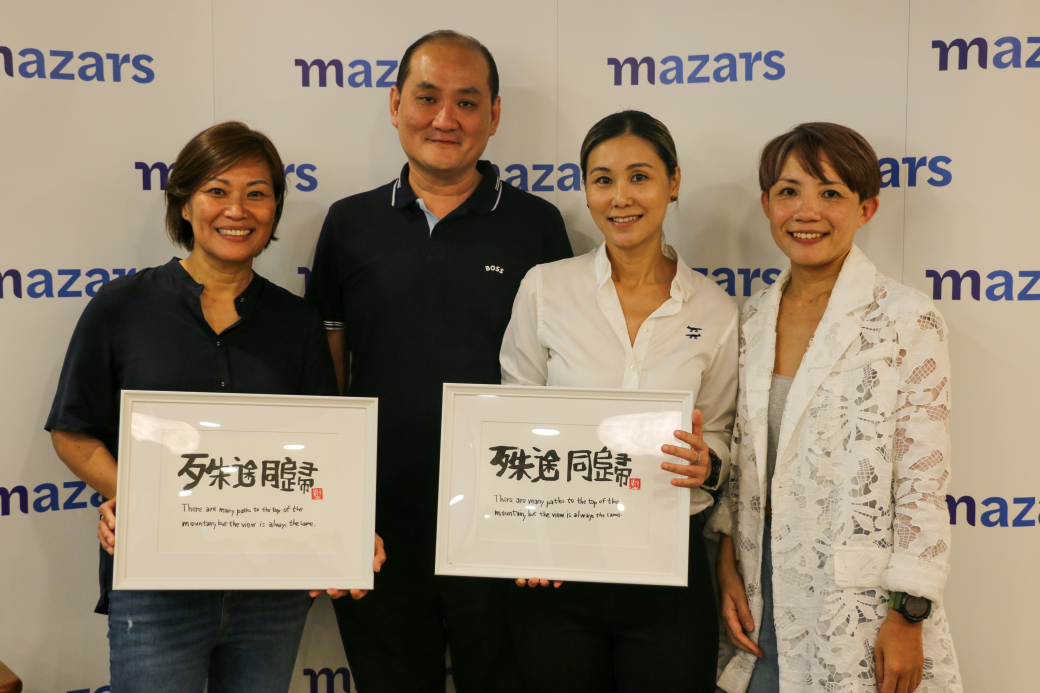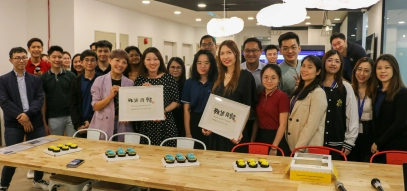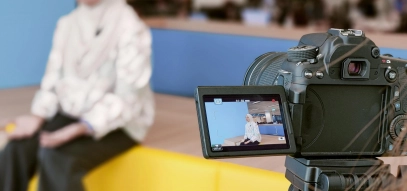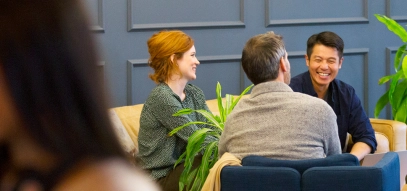Marie is a marketing whiz turned certified dog behaviourist. She co-founded Soul Made, a wholesome food products supplier and enjoys running ultra-trail races. She left her fast-paced corporate role to advocate for dog welfare and no-kill shelters.
Joanne is a member of the Singapore Women's Everest Team, Southeast Asia's first all-women team to summit Mount Everest in 2009. True to her passion, she founded the outdoor activities company, Ace Adventures. Joanne was named the Women's Weekly's one of the Great Women of Our Time and received the Special Commendation from the President of Singapore.
Coincidentally, Joanne and Marie both participated on a mountaineering trip to Kazakhstan in 2016 when they scaled Ong Teng Cheong peak and Ong Siew May peak during National Day in memory of the late President and his wife.
(From Left to Right: Joanne, Chee Choon, Marie, Selina)
Read further to learn the stories of these two inspiring women:
1. In a survey of Glassdoor contributions from 2016 – 2021, researchers have found that women were 35% more likely to negatively mention toxic culture than men and this gap has widened considerably as a result of the pandemic. As a woman, how do you feel about this study? Have you experienced a toxic workplace before and how did it affect you professionally and personally?
Having left her job recently after the onset of the COVID-19 pandemic, Marie observed that the pandemic has changed the way we treat others.
“I noticed that people have become less kind to one another. Unfortunately, I had experienced a toxic work culture to the point that I developed depression. I have no issue running 100-kilometer races in the mountains but despite being a physically strong person, the negativity took a toll on my mental health.
“When you're constantly faced with negative comments, bullying behaviour and unsupportive seniors, you are bound to be affected. I suffered from panic attacks and went to seek medical advice. I then made the difficult decision to resign from work.
“As a woman, I can say that there’s more pressure when it comes to both our profession and family life. This is why I always remind my friends that the most important thing is to be kind to one another. We already have so much on our shoulders.”
2. How can we improve our mental health and wellbeing and nurture a more healthier work environment?
Joanne said that human interaction plays a role in our wellbeing. “There are times when people expect you to exert yourself and push yourself beyond your limits. On the mountains, we do experience stress, and this is something that you can relate to in the corporate life. We have a strict deadline such as having only four hours to move from one camp to another. But sometimes you get stuck in the snow and plans get derailed.
“At work, you often have deadlines and expectations to fulfil. And when things do not go as planned or we feel like we did not perform our best, it’s easy to feel like we’re not enough. ‘What did I do wrong? What have I not done properly?’, and you will start undermining and blaming yourself. This can affect your wellbeing.”
Marie came across and interesting story recently that compared the price of a bottle of mineral water at different places. “The water is $0.50 at FairPrice, $5 at Golden Village at $10 at the restaurant, even though they are all the same item. So if you find yourself in an organisation where you’re not valued, you are just in the wrong place.
“We can try to look at it in a positive light. Instead of staying in a toxic environment, maybe you’re meant to be in the mountains, or walking the dog, and this makes you happier. When I became a dog behaviourist, the owners told me that they’re grateful for my work. The same goes for professional mountain climbers like Joanne, whose services as a guide are appreciated by her clients. Be somewhere where you are appreciated.”
3. How do you find passion in your career and personal life? What makes your heart tick?
Joanne has been running her core business for 20 years, but still struggles to this question. “Every other year, I would encounter challenges and find myself questioning if I made the right decision to start a business. In 2020, when business was picking up, COVID-19 happened and disrupted my business.
“Outdoor adventure and climbing is a very niche market. I get questions like ‘how many rock climbers or mountaineers can you find in Singapore?’ I need to find ways to look for and gather these pioneers together.
“It’s normal to have doubts but I always try to keep an open mind. I often ponder about my passion and try to find the answers along the way. Every 3 years, I would tell myself if I can’t make it, I’ll return to the workforce. But despite the challenges, I am still here. The colleagues and people I meet in my profession are my sources of inspiration. A simple conversation with someone can reignite my passion in my work and sustain my motivation.”
Marie said dogs make her heart tick. “When it comes to passion, what’s something that you’d be happy doing every day? Everybody has different interests and for me, I have always gravitated towards dogs.
“Of course, I wasn’t born a dog behaviourist. I had a corporate job and even started my own marketing company. I was planning glamorous parties and fashion shows for big brands. Despite the money and prestige, I was only truly happy when I was rehabilitating dogs at the shelter.
“I found myself enjoying volunteering at the shelter more than putting on a glamorous front as a marketer hosting gala dinners and events. Eventually, I made the decision to close down my company. At first, I was a bit lost without the constant emails. But in the end, working with the dogs makes me genuinely happy.
“Believe in yourself and don’t just be one-dimensional. Rather than being known for one aspect, be a multi-hyphenate, where you can do multiple things that you love at once. Following your passion doesn’t necessarily mean you have to quit your job. You can pursue it as a side career or your hobby.”
Selina (moderator) shares her experience, “It’s true. Despite working five days a week, I still choose to spend my weekend doing what I love which is hiking. Rather than feeling tired, it makes me feel energised. So it’s important to recharge your batteries to keep yourself going. Search deep within yourself to find your passion.”
4. Having said that, can you share some of the obstacles that you have encountered while following your passion?
Due to the niche nature of her profession, Joanne recounted her experience starting out in a male dominated field. “Unfortunately, when we first started out, I did not have female colleagues in the industry which led me to feel ostracised at times. I was much younger then and I remember wanting to prove myself to my male peers.
“Our company worked with media to create hype for events. As a technical provider, I received comments like “She’s a woman, are you sure she can do it?” which, as a young person, puzzled me.
In my heart I would feel what’s wrong with being a woman, as long as I have the skills to deliver the job? I felt challenged and I wanted to fight back. At the opposite end of the spectrum, you have companies using my gender to sell their products and services.
“But as I grew older, I realised that at the end of the day, what others think of me doesn’t matter, as long as I deliver my work to the best of my capabilities. No matter the gender, anyone can excel at this job if they have the skillset.”
When Marie decided to venture into dog behaviour training, not many people were familiar with this field.
“Thankfully, I have built a close connection with journalists from my PR days, which opened up many opportunities for me. I reached out to the editor of Pets magazine offering to write a free column to share about my role. This initiative was not profit-driven, but for the sake of spreading awareness.
“I would like to stress that age is just a number. At the ripe age of 38, I was on the cover of Run Magazine. I only started running as an adult. I was not a school runner, neither am I a national athlete. But I strongly feel that you must always tell your story. My personal story is about an ordinary person who decided to run a marathon. Whether you’re 45 or 60 years old, you can always be the best version that you can be.”
5. It must have been an incredible experience being part of the first Singapore women team to scale the Mount Everest, and you have completed more than 50 expeditions since then. Can you tell us about your journey and the lessons you’ve learnt from your expeditions that can be applied in our career?
Joanne did not find the climb difficult, rather it was fun. However, she recounted the challenges she faced along the journey.
“I climbed Mt Everest in 2009, one of the challenges then was to raise funds for the expedition. We actually started planning back in 2004 with the intention to go in 2008. But we didn’t take into account the Beijing Olympics, which affected the financial aspect of our journey.
“Training was not difficult. I woke up early every day and did half marathons before going to work. We were also expected to stay healthy and monitor our bodies all the time. Falling sick with even minor symptoms like flu and cough could impact our performance.
“Our biggest challenge was networking with people and approaching senior executives for sponsorship. Since we’re from Singapore where there are no mountains, our abilities as mountaineers were questioned a lot. I’ve also received remarks like, ‘This group of Singapore women are not pretty enough, so how can we market them?’
“Even after seeking the help of a marketing agency, we were not able to meet our fundraising goals. We were physically fit, competent and ticked all the boxes in our climbing profile. But we couldn’t scale the Everest without additional support. So we resumed the fundraising activities on our own and eventually met our target for the expedition in 2009.
“The biggest lesson here is we need to take charge of our own project and take ownership of our work. Don’t let others do it for us!”
For Marie, her ultra-running experience has been a journey of self-discovery.
“A key lesson that I have learned is whatever happens, you must learn to accept it and adapt accordingly. Even the most skilled ultra-runner cannot control external factors in a race. When you’re out alone in the terrain, giving up is not an option. If there is a bad weather, or if you sprained your ankle, you could adapt, and adjust your strategy to safely get off the mountain and finish the race.
“The experience also helps me to evolve as a person. The most beautiful thing about running ultra races alone in the wilderness or the mountains, you have a lot of time to yourself.
If you were to ask my friends 10 years ago, would Marie run a race alone in the forest in the middle of the night? They would say no. I was afraid of mud, dirt, insects and the dark. But when I started ultra-marathons, I trained myself to brave even in daunting situations or ghostly encounters. Similarly, in life you have to learn to conquer your fears.”
6. Before we end today’s session, do you have some words of wisdom to share?
Marie: “Happiness is a choice. A lot of people out there think “I also want to be like you, and I don’t have to work.” In reality, I gave up a lot of important things to be able to achieve this lifestyle. When I used to have a high salary, it was so stressful that I would spend it all on designer items as a form of retail therapy. But now, I don’t shop that often anymore. Working with dogs bring me happiness. So it's a choice if you want to have more things, or you want a simple life.”
Joanne: “Build a strong network around you, be it your family members or friends. You don’t need many people; you only need a few supportive individuals. For me, having this network is very powerful. Everest is a personal goal of mine and when opportunity came, I shared it with my close friends. I received a lot of support from them to help me to move towards the right direction. This support system can push you to reach your potential, and comfort you when you need it most.”
Conclusion: People is at the heart of Mazars
At Mazars, people define who we are as a firm. This is why our people strategy is much more than a traditional human resources strategy. It puts the best interests of our employees and their development at the core of our policies and actions.
We are dedicated to build a culture where people have a sense of belonging and pride. We are committed to providing a safe and inclusive working environment that allows Mazarians to thrive and grow at every stage of their professional journey.
Here, we offer opportunities for internal mobility where Mazarians who are interested in a change of role can join another business unit and gain exposure to different industries. Our people will be at the driver’s seat in designing their career pathway at the firm.
Ensuring the health, safety and wellbeing of Mazarians is one of our key priorities, and we take a holistic approach to meet this commitment. We support Mazarians through changing work patterns and we organise wellness activities and early releases to support the mental health of our employees and promote work-life balance.
Learn more about the activities that we have in celebration of IWD 2023 here





